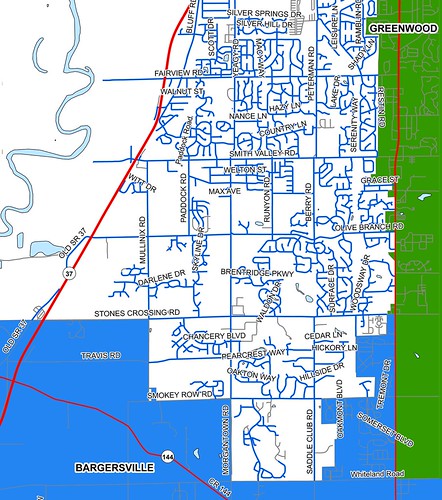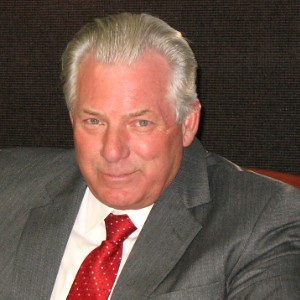| Dann Veldkamp

Most of our readers live in “unincorporated White River Township,” often referred to as Center Grove. Very broadly, if you live south of County Line Road, west of the businesses that line State Road 135, and north of Smokey Row, you live in in the unincorporated area. This area is the white area on the map. Your mailing address may be Greenwood or Bargersville, but that does not mean you live in either of those municipalities.
A board of three County Commissioners represents all of Johnson County. If you live in the unincorporated area of White River Township, this is your “local” government. The Commissioners are Brian Baird of District 1 (the three southern townships), Tom Kite of District 2 (the middle three townships), and Ron West of District 3 (the three northern townships). Even though they “represent” districts, they are all elected at large, or by all voters of Johnson County.
For this article, we sent five questions to each of the three Commissioners. While Baird and West responded to our request. Tom Kite failed to do so, even after an extension of the deadline, three requests by email, and a personal request delivered the week before deadline. Unfortunately, he did not consider it important to respond.
So, what does a County Commissioner do? As Ron West explains it, “Commissioners are to the county what a Mayor is to a city. We are the executive branch of county government.” He continues, “Commissioners make policy, oversee county property, pass ordinances, hear relief appeals, personnel matters, litigation, road and street maintenance, claims, insurance coverage, and about a couple dozen more things.”

Obviously, their decisions have a significant impact on the Center Grove area. At a recent homeowners association meeting, some in the neighborhood proposed adding an additional stop sign. When informed that in order to do so they needed to get the permission of the County Highway Department, a resident was incensed: “Why should we have to go to Franklin to ask permission to place a stop sign in our neighborhood?” The answer is simple: because unincorporated areas live under the rules of county government, and Franklin is the home of Johnson County government.
In addition to the Commissioners, the County Council plays an important role. Brian Baird explains the role of the Council as being “responsible for setting salaries, the annual budget, and special spending. The council also has limited authority to impose local taxes, usually in the form of an income tax that is subject to state level approval, excise taxes, or service taxes, like those on dining or lodging.”
As for the Commissioners, “All three Commissioners serve in the same and equal capacity. However, we do concentrate on particular issues that we might have expertise in, and report to the other two Commissioners as to our findings or progress,” says Ron West. Baird says he is “very concerned of the inability of us, as a Commission, not being able to communicate effectively due to certain statutes in place currently.” State law requires a public notice any time a quorum of a public body meets. In the case of the three commissioners, if two sit down over coffee, they are holding an “official” meeting. This limits their ability to simply discuss issues in a casual environment.

“Center Grove” is the most densely-populated area in the county that is not a town or a city. As such, its needs are different from those of other areas of the county. As Ron West describes it, “Center Grove, as an example, will have needs associated to population such as planning and zoning, traffic congestion, safety, and, of course, incorporation consideration. Rural areas require needs such as drainage, legal ditches, machinery movement on narrow roads, and possible annexation.” Baird says, “Although there are some differences in the areas, such as emergency calls, crime rate, maintenance of roads and areas in the higher-populated areas, which are addressed daily by the Police Departments, Highway Department, etc., all citizens deserve the same treatment.”
It’s apparent that the needs vary by population density; the question is: Is it reasonable to expect one governing body to address such diverse needs? Do the needs of unincorporated Center Grove match the primary responsibilities of the County Commissioners?
While the timetable is not set, it is logical to assume that I-69, an Interstate highway that extends from Mexico to Canada, will be completed. The 27-mile stretch from Crane to Bloomington is expected to be completed by late 2015. When this happens, traffic on State Road 37 is expected to increase by over 300 percent. The state is in the process of accepting bids for the 21-mile section between Bloomington and Marstinsville. Some in White River Township are are already beginning to plan for the arrival of I-69. The White River Township Fire Department headquarters is located in the area of the assumed path of the Interstate. Fire Chief Pell is currently leading an effort to scout alternative locations for the headquarters.

Bargersville and Morgan County are starting to look at how to prepare for the expected interchange at what are now State Road 37 and State Road 144. The Commissioners are not as concerned. West says he “cannot imagine what pre-planning Morgan County and Bargersville could be doing with any degree of certainty.” When I-69 was first announced, West says he asked the State to give Johnson County a definite route through our county so that we might begin to plan properly. The State did not provide the route. Now, with funding uncertain, and all current plans showing I-69 following State Road 37 through the county, the county has simply suspended any planning for I-69, while others continue to plan for this significant development.
When asked what the biggest challenge the county is currently facing, the commissioners focused on county-wide issues. Brian Baird notes, “We have several challenges facing us at this time. We have the consolidation of the dispatches and 911 call center, new court system, economy issues, and everyday issues involving approximately 500 employees.
Commissioner West responded that the “Biggest challenge most likely will be in the criminal justice arena, jail expansion, community corrections expansion, PSAP (Public Safety Access Point or 911 call center) consolidation, new court or courts, and crime volume. All this leads to funding which will then be the biggest challenge.
Although the commissioners are “part-time” employees, they have a significant workload. Baird notes that they sit on several boards and are responsible for maintenance and construction of county-owned properties. This job load may be one of the reasons that the county is slow to respond in some situations.
For example, the flood of 2008 damaged many homes across the county. For some homeowners, such as many in Franklin, the compensation from the government was settled in about a year. For those under the Commissioner’s control, such as homeowners in Bluff Acres, it took over three years for the county to complete the process. For Franklin, putting the flood in the past was required to maintain a thriving community. The mayor drove the effort to a quick end. However, in the context of the entire county, with many of the nine townships affected by the flood, the plight of a few homeowners in White River Township was farther down the priority list. Other rules may have applied. And that, no doubt, played some part in the delayed satisfaction for the “Center Grove” residents. While this doesn’t reflect on the effort or care of the County Commissioners, it does allow one to wonder if they are able to provide the services needed by residents of the unincorporated Center Grove area.




